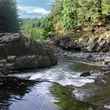During a late-night meeting of the House Natural Resources Committee May 6, as congressional members were negotiating the inclusions in the federal budget bill, two Western lawmakers put forth an amendment that could have lasting impacts on America’s public lands and how they’re managed going forward.
U.S. Reps. Mark Amodei of Nevada and Celeste Maloy of Utah, both Republicans, proposed putting potentially hundreds of thousands of acres of public lands — particularly in Nevada — on the auction block as a means to raise money to pay for the Trump administration's proposed tax cuts for wealthy Americans. According to the Nevada Current, the amendment to the budget bill would require that some 450,000 acres of Nevada public lands be sold within two years of the budget bill’s passage.
In Nevada, most of the land proposed for sale would be offered to counties and municipalities in urban areas, like Las Vegas and Reno, as they grow and need more real estate for housing development. In Utah, the 11,000 acres identified for sale are on the edges of the growing city of St. George and, presumably, would be used for further housing development. The proceeds from the sale would go into federal coffers. The Utah sale would be required within just 180 days of the budget bill’s passage.
It’s the latest in a series of Congressional budget proposals and White House executive orders that apparently seek to chip away at the integrity of America’s last, true national treasure — its vast estate of public lands that belong to each and every American. Trump has issued executive orders to re-open the Arctic National Wildlife Refuge and the National Petroleum Reserve to unfettered oil and gas drilling, and to make nearly every federally owned acre of land available to mineral or energy leasing, all while dropping royalty fees industry would pay the government for the privilege to drill or mine. Many of these orders have found their way into the House’s current version of the budget bill, alongside the new provision to sell public lands. There’s a clear strategy from the Trump administration to use public estate as a revenue source to fund its government reduction efforts and boost industry — the bill even includes an incentive for the coal-mining industry.
An unpopular proposal
The trouble is, selling public lands just isn’t very popular. According to a poll conducted by the Trust for Public Land, 71 percent of Americans oppose selling the nation’s public lands to private interests. And, the literal 11th-hour inclusion of the amendment in the budget by GOP lawmakers and approved by the committee along party lines, offers a glimpse at the sketchy nature of the amendment. The amendment was offered and accepted at 11:20 p.m. on May 6, and the committee voted along party lines to approve its portion of the budget bill in the early morning hours of May 7. In all, there were 11 House committees working on different portions of the budget bill.
“This is just some truly odious sausage at 11:20 p.m. at the end of a long markup,” said ranking Democrat on the House Natural Resources Committee, Jared Huffman of California. Amodei’s fellow Nevadans in Congress condemned the middle-of-the-night inclusion that could set a troubling precedent for public lands disposal, should this bill earn passage by the full House in the days to come.
“In the dead of night, Rep. Mark Amodei led House Republicans in throwing Nevadans under the bus — advancing legislation to pay for their disastrous tax bill by selling off Nevada’s public lands,” said U.S. Rep. Susie Lee, Amodei’s House colleague from Nevada. “For decades, federal law has ensured that proceeds from land sales in southern Nevada stay in Nevada. Last night’s traitorous maneuver instead would send Nevada’s land proceeds to Washington to pay for tax cuts for billionaires.”
Among the hook-and-bullet crowd, the response was predictable. Backcountry Hunters & Anglers took a dark view of the proposed sale, saying the proceeds from such a land sale would amount to a drop in the bucket when it comes to funding a federal budget that’s projected to approach $7 trillion. And, said BHA’s Devin O’Dea, the proposed land sale bypasses the Federal Land Transaction Facilities Act, which was designed to require a thoughtful approach to identifying federal lands ripe for sale or transfer, and to ensure any lost public access to federal land would be mitigated.
“This amendment isn’t just a backdoor land sale — it’s a deliberate effort to circumvent a process that was thoughtfully designed to protect and improve our nation’s public lands,” O'Dea said. “This last-minute maneuver violates that principle and sets a dangerous precedent that could very easily pave the way for larger-scale land disposals in the future.”
Republicans can’t even get on board
To further complicate things, the outright sale of public lands doesn’t even have the support of Congressional Republicans in other Western states. On Wednesday, the very morning the House Natural Resources Committee inserted the land-sale amendment and then voted to approve it, a bipartisan group of lawmakers met to announce the formation of the Public Lands Caucus, a bloc of federal lawmakers who say they’re ready to stand guard against efforts to blindly dispose of public lands and to ensure their wise use in the future.
“Public lands are where I learned to fish, hunt, and connect with my family and culture — and those experiences shaped who I am,” said caucus founder Rep. Gabe Vasquez, a New Mexico Democrat. “These lands don’t belong to one party or one group of people; they belong to all of us. The Public Lands Caucus is about protecting that birthright — bringing Democrats and Republicans together to preserve access, defend conservation, and invest in the outdoor economy that powers rural communities like mine in southern New Mexico. This is personal for me, and I’m proud to lead this bipartisan effort to keep our public lands in public hands.”
Vasquez is joined by some prominent Republicans in Congress — something of an overt rebuke of Trump’s apparent strategy to use public lands as a piggy bank to fund his tax-cut-heavy federal budget. U.S. Rep. Ryan Zinke, despite his atrocious record on public lands during his tenure as Interior Secretary during the first Trump administration, is a co-founder of the caucus along with Vasquez. He, too, gave a nod to the important role public lands play among the hunting and angling communities.
“The bipartisan Public Lands Caucus brings together lawmakers who don’t agree on much, but we agree on and are ready to work together to promote policies that advance conservation and public access,” Zinke said Wednesday. “I look forward to working with … all the members of this caucus so future generations can enjoy the same opportunities to hunt, hike, fish, make a living and enjoy our uniquely American heritage.”
Zinke’s not alone. Fellow Republican, U.S. Rep. Mike Simpson of Idaho is the caucus’ vice chairman, and, like Zinke, made it clear that he supports ready access to public lands for all Americans.
“Idahoans live in Idaho because we love our public lands," Simpson said Wednesday. "This trend is common across the West, where public lands are a part of our daily lives. As a lifelong Idahoan and Chairman of the House Interior and Environment Appropriations Subcommittee, I remain committed to preserving access to our public lands and defending our way of life. I look forward to working with my colleagues to ensure future generations can enjoy the same benefits that we do today.”
Budget bill still has hurdles to clear
While the insertion of the amendment is troubling, the budget bill still must face a full vote in the House in the coming days or weeks. And Democrats are doing their level best to shame Republicans into rejecting the bill, or at least parts of it that work to strip the American people of both public lands and access to it.
In the upper legislative chamber, U.S. Sen. Catherine Cortez Masto, a Nevada Democrat, called the bill “a land grab to fund Republicans’ billionaire giveaway tax bill, and I’ll fight it with everything I have.” Her colleague and fellow Nevada Democrat, Sen. Jacky Rosen, said Amodei “sold out Nevadans in the dead of night by passing a flawed, hastily-drafted proposal.”
In the House, Speaker Mike Johnson has vowed to pass the House version of a complete budget bill, including all the industry subsidies and public lands sales amendments, by Memorial Day.






























Comments